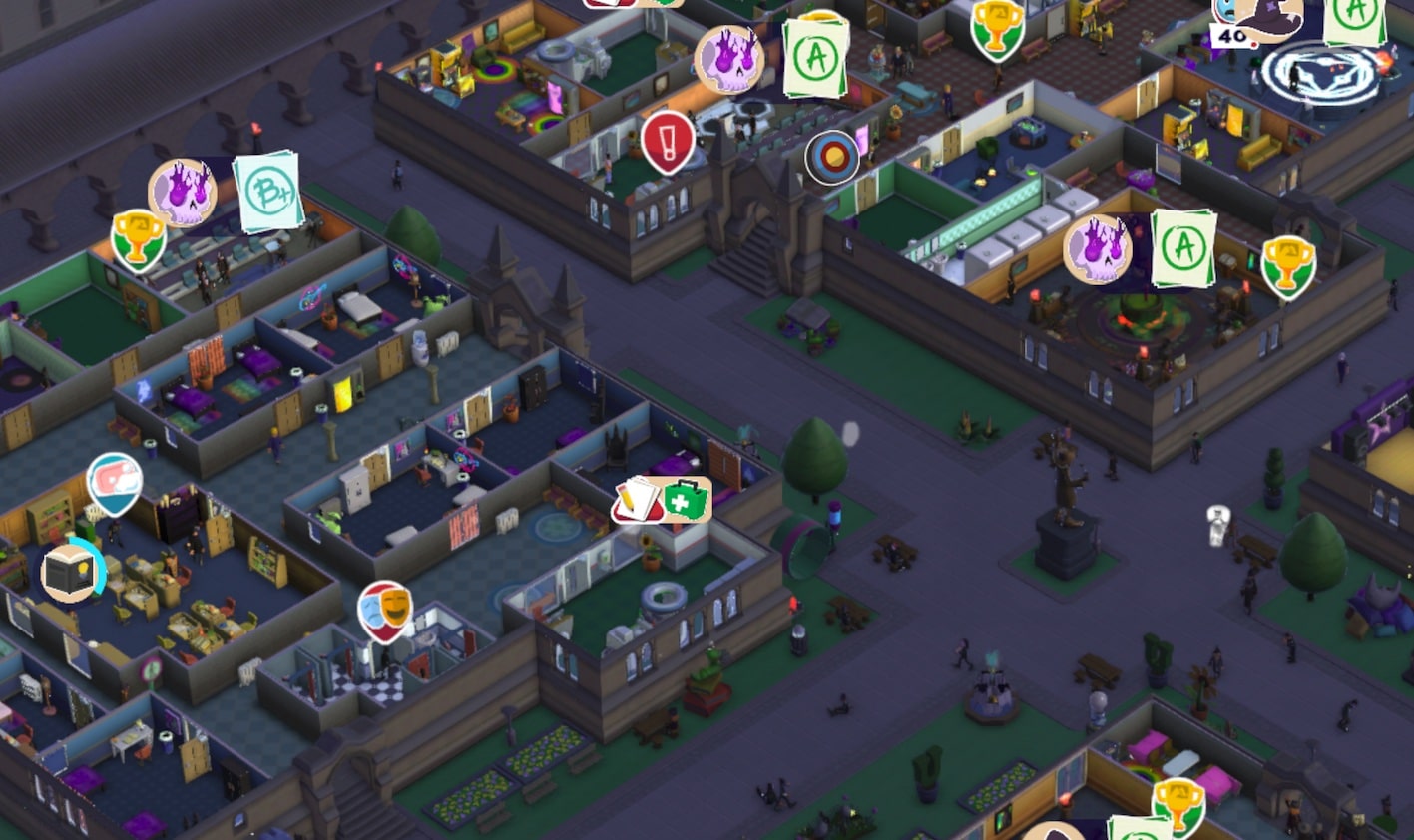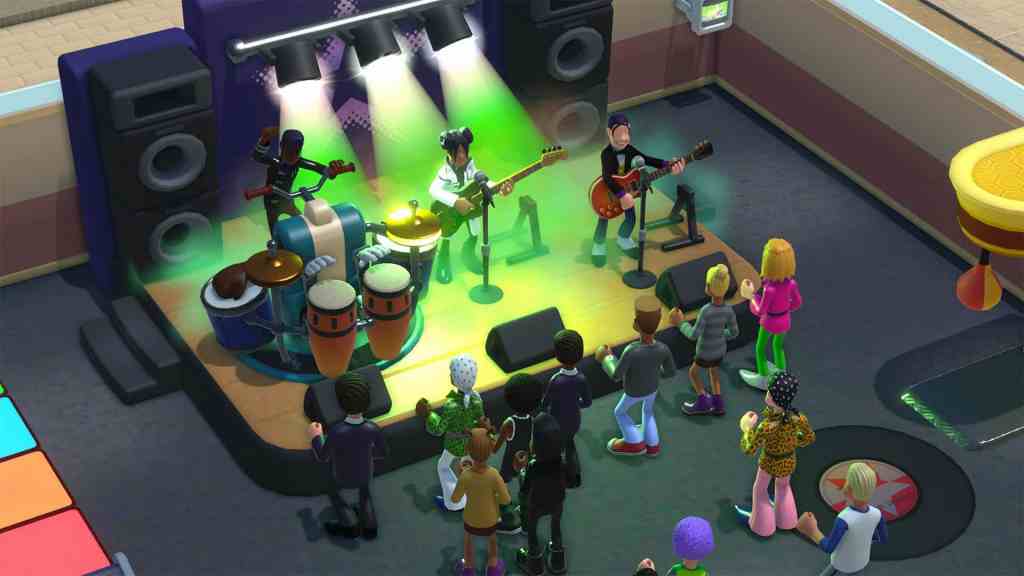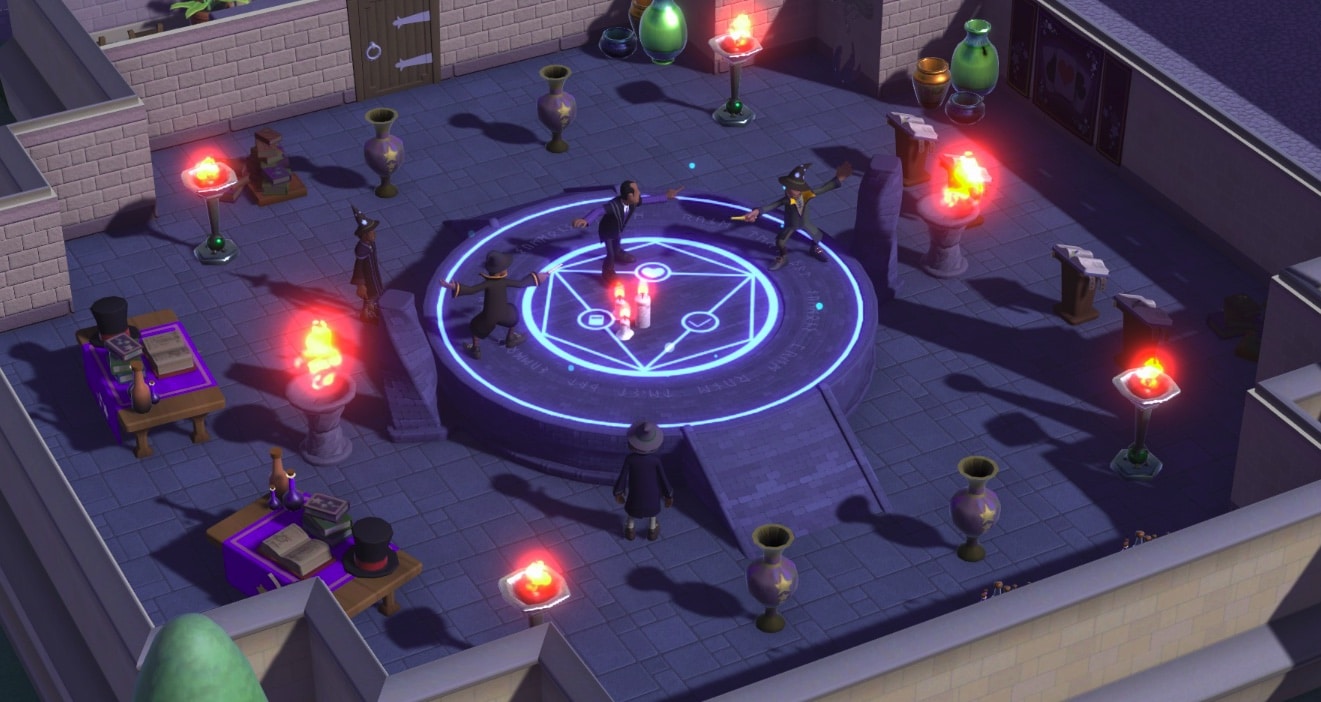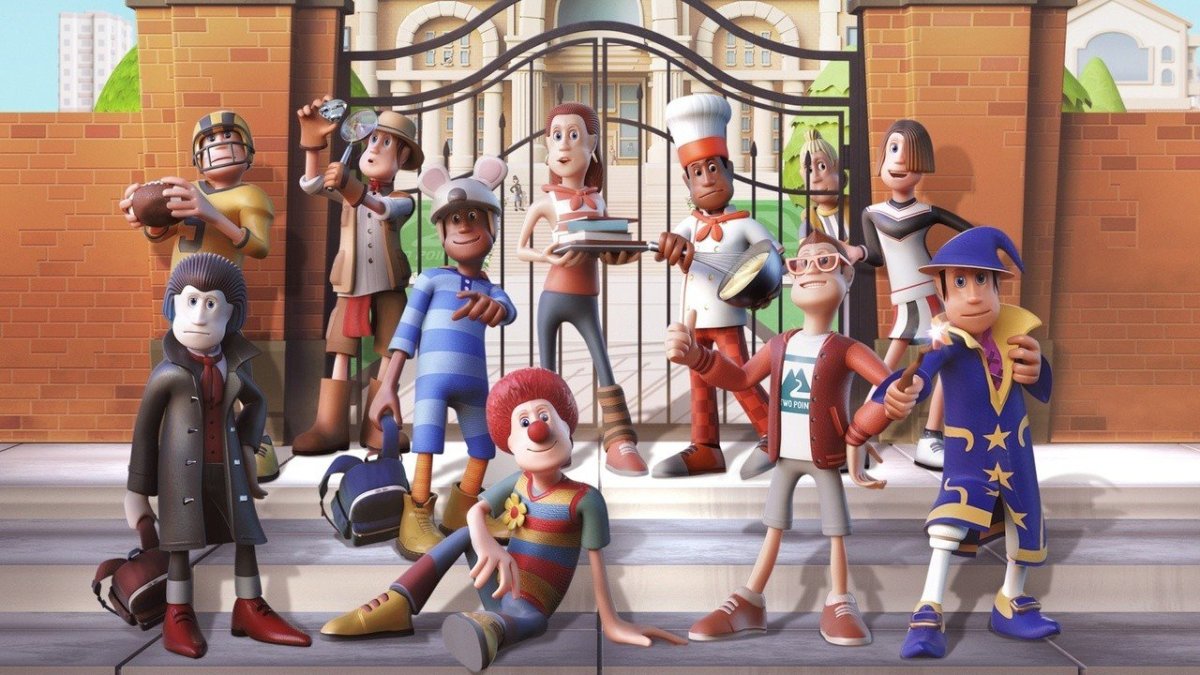Picture senior teacher Jason Malarkey, of Two Point Campus, with Happiness and Energy firmly in the red, shoulders slumped, trudging to the staffroom. He just needs to sit on the battered couch and consume Cheesy Gubbins from the vending machine for a short while. He’s been lecturing on the topic of how to spin a basketball on one’s finger for an entire month. Of course, with no money to hire additional teachers, I intercept him in the hallway, literally pluck him into the sky, and plonk him into a tutorial room, to work remedially with a student who wasn’t paying attention during the lecture.
This anecdote is, of course, from Two Point Studios’ facetious new business management simulator, Two Point Campus. I’ve been a music teacher for twenty years, the last eight of them in tertiary institutions. Is there anything more cathartic (and hilarious) than tactile, relatable engagement with a video game that perfectly understands your job?
Education has been a bit much, recently – especially thanks to Covid, with careful and creative management required to stretch resources. It’s not that I really know anything about managing a university, of course. I’m at the coalface of education; mostly helping game composition students figure out why their synths won’t loop seamlessly, among other important things. Nonetheless, I have certainly experienced what it’s like to be plonked back into class without a proper rest; and it’s not actually funny at all.
Sorry, Jason.
Read: Two Point Campus review – Extremely cool for school
As a parent who also has two kids (and a teacher partner) in public schools, I have complex thoughts about the distribution of resources for education in Australia. For example, is the plunge pool planned for the principal’s residence at The King’s School really in service of our state’s most important educational goals, or just a bit of a swim? If ‘plunge pool’ were an unlockable item in Two Point Campus, I would laugh, but probably not without bitterness. If nothing else, this game is a powerful opportunity to be in charge of the dosh, for once, and to reflect on the logistics of this tough, but rewarding profession in a way that is half hilarity, half ‘not actually funny at all’.
Size Matters

Capacity is a primary concern for schools. If you’re lucky, demountables are dumped on the oval, when Year 8 gets too large. If you’re not lucky, you’re doing music outdoors. Having played (sincerely too much) of Two Point Studios’ previous game, Two Point Hospital, one of the first things I noticed about Campus was that space feels different, by necessity.
In Hospital, nothing fits. It was one of the game’s great in-jokes. A building might be 11 by 13 tiles, but each clinic’s minimum dimensions were some unwieldy combination of 3, 4 and 5. Generally, a small room in Hospital was functional and easy enough to decorate, for prestige, so there was no impetus to enlarge it.
In Two Point Campus, most rooms need to be duplicated and expanded, usually at the beginning of each year, as new cohorts arrive, and established cohorts require additional equipment. You can create a bathroom in 1 by 2 tiles, or a dormitory in 2 by 2, but why? Longer rooms allow for more beds, because they are slightly narrower than 1 tile across. Students seem happy to squirm goofily under the covers, via the foot of a bed, if its sides aren’t clear.
Given students don’t own beds and just use one at random, whenever they are tired, I was going to make a gag about ‘hotbedding’. Then I read that sharing beds, via allocated sleeping hours, is a real thing that affects up to 3% of international students in Australia. My respect for international students absolutely balloons every time I hear these stories and I feel sorry that I didn’t already know this.

Oddly enough, I do miss playing ‘room Tetris’, especially because I’ve taught classes in some unlikely locations. Picture your saxophone teacher (me), feet on cricket stumps, softball helmet perched comically on head, sheet music balancing on a gym mat, making the best of a teaching and learning environment that was literally a sports closet (an experience which, in retrospect, might have actually been a hazing ritual). The acoustics of that sports closet were terrible.
I think I’ve done a decent job of rooming in Campus, prioritising flexibility to the point of deleting the entire marketing department and replacing it with a temporary gym whenever the marketing guy takes a break. By the way, this is one area that Two Point Campus gets wrong – marketing people have boundless energy in real life. They can be found in hallways, muttering ‘chips and cans’, occasionally yelling “cheeseboard”, long after all other staff have disappeared for the day.
Selling Out
Relatable humour underpins all aspects of Two Point Campus, of course. Consider the incredible staff room coffee table description; ‘found in a skip’. And the administrator, who absolutely roasts students in an exasperated (but affectionate) manner. ‘Stupid questions will make you look stupid,’ is something a teacher would never say. Instead, I assure my students, ‘There are no stupid questions,’ while fantasising about Cheesy Gubbins and clever questions.
Campus also riffs on music education (my core field), specifically, on the Upper Etching campus. I’m used to students inventing weird instruments, as in the Musicality classroom here. There’s a strong precedent for such experimentation, thanks to composers like John Cage – prepared pianos and so on. I mean, if there’s a kick drum, why not also have a ‘punch drum’ in your kit? That’s logical. The tromborgan, however, goes too far. I’m not sure they could have chosen a more enraging and aesthetically displeasing two instruments to force together as a portmanteau.

Regarding Upper Etching’s new course; Countercultural Studies, I’d argue music students aren’t all estranged from mainstream society. Some, yes, God love ‘em, which is why it’s funny – but all? Do music institutions teach counterculture in real life? That’s an uncomfortable question. No education, especially creative arts, is devoid of values, nor exempt from wider social responsibility. I plan content and delivery thoughtfully, even while crossing my fingers that students feel comfortable to form opinions about their practice, on their own terms.
Upper Etching is the wildcard campus because they don’t believe in students paying for arts education, which is another weighty stance. If I’ve understood how this level works correctly, you’re paid $2000 each time a student skills up. But you’re farming them for Bungle Records as money-generating units, not artists. As a music teacher, this is both excruciatingly entertaining, and an existential crisis.
Friends Forever
On a more cheerful note, the most striking difference between Two Point Campus and Hospital has to be the focus on social interaction. In Hospital, patients suffered the shame and agony of their Bloaty Head alone, before either being cured or dying (still alone) in a corridor. In Campus, you’ll see students chatting on a bench, holding hands and joining useful clubs, like Speed Walking or Power Napping – and let’s not mention Orb, the money-generating, unhappiness-causing, pyramid scheme or maybe, cult.

Students begin their relationships at tables in the Student Union (which is actually a bar), then progress to gaming tables and, eventually, the water cooler, where Giga Chums are made, alongside Hydration being satisfied – gotta love those space-saving, multipurpose objects.
In real life, I love witnessing my students forming friendships. They support each other creatively, master difficult toolsets together and attend game events, game jams and so on. Professional development for teachers often centres around how to facilitate collaboration, but I find that games and music education naturally lend themselves to such opportunities.
I care more about my Campuses than I did about my Hospitals. I’ve even learned the names of individuals, poked through their stats and gone to great lengths (at Jason’s expense) to ensure the ‘at risk’ don’t fail. In Hospital, death simply meant hiring a Ghostbuster, and dead patients paid their bills. In Two Point Campus, student retention relies on them being happy and social, and I’m more invested in their success. Caring, as it turns out, is powerful motivation.
With Care
And so, we conclude with the great catch-22 of teaching in real life; the precise and varied mechanisms of its delivery create a perfect storm of caring, so when things get tough, teachers work harder, for the sake of their students. This proves that we can be stretched, sometimes in response to acute crises, like Covid – sometimes just because the sports closet is literally the only ‘room’ available on Tuesdays, thus undermining long-term sustainability and healthy work practice.
What happened to Jason? Did he ever get a break? No. I fired him because he was ‘bin blind’ and prone to dropping rubbish. This reveals that (as a manager) I’m not committed to creating a bin-blind accessible workplace and that I don’t value the hiring of adequate janitorial staff – though I promise this is only an in-game response. In real life, accessibility and non-teaching staff are vital.
It’s probably for the best that I have exactly zero real-world ambition to manage education. I don’t want to decide who gets the plunge pool and who gets the closet. I am a teacher forever.
Two Point Campus is too real, but laughter is healthy. At least there’s no marking involved.





